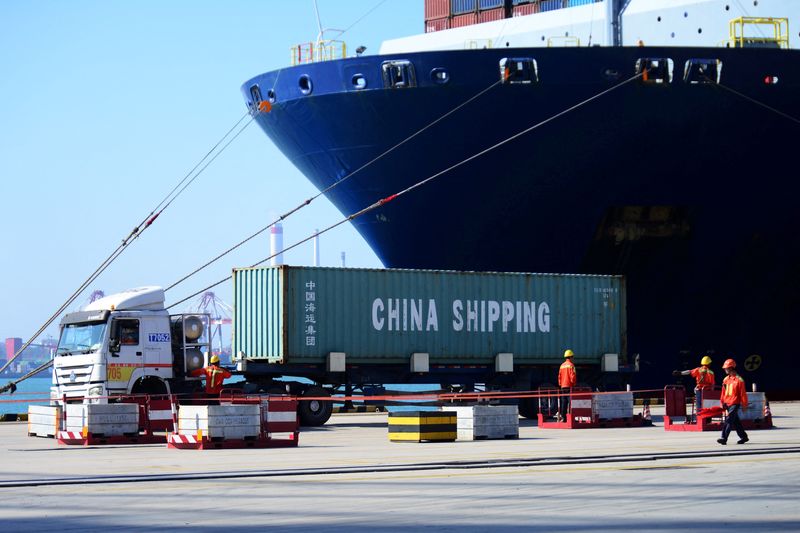By Joe Cash and Christoph Steitz
BEIJING/FRANKFURT (Reuters) - Swiss solar panel maker Meyer Burger (SIX:MBTN) is facing the brunt of competition from China and is warning it may have to close its loss-making production plant in Germany unless the government steps in with financial support.
"Chinese manufacturers are deliberately selling goods in Europe far below their own production costs," chief executive Gunter Erfurt told Reuters.
"They can do this because the solar industry in China has been strategically subsidised with hundreds of billions of dollars for years."
Growing alarm over Chinese industrial overcapacity flooding the European Union with cheap products is opening a new front in the West's trade war with Beijing, which kicked off with Washington's import tariffs in 2018.
Brussels' trade policy is now also turning increasingly protective against the global ramifications of China's production-focused, debt-driven development model.
Throughout last year, China's policymakers flagged their intention to make domestic demand a more prominent growth driver to wean the world's second-largest economy off its decades-long reliance on infrastructure and the property sector.
But China has diverted financial resources from real estate to manufacturers rather than households, raising overcapacity concerns, deepening factory-gate deflation, and prompting a European Union investigation into its electric vehicle sector.
China's current path leads to more trade conflicts, warns Pascal Lamy, former head of the World Trade Organization, now distinguished professor at China Europe International Business School.
"This is not sustainable," Lamy said. "Overcapacity will inevitably lead to a problem."
"We have come to the realisation that this is a structural problem and that it stems from the fact that part of the Chinese production system is not driven by market behaviour, but by Chinese Communist Party-directed investment."
That investment-driven model has led to industrial overcapacity in China's major sectors such as steel, and more recently in electric vehicles production in the auto industry and high-tech goods.
China's trade partners are hitting back.
Washington has imposed trade tariffs on China, and also wants to cut off Beijing from high-tech semiconductor chips to slow its technological and military advances. It is also ramping up infrastructure and industrial investment at home.
The Economist Intelligence Unit forecasts China's battery manufacturing capacity outpacing demand by a factor of four by 2027, as its electric vehicles industry continues to grow.
Outside the automotive industry, Brussels is also seeking to reduce its reliance on China for materials and products needed for its green transition. Beijing is conducting its own anti-dumping probe into EU brandy.
India imposed anti-dumping duties on some Chinese steel in September 2023, adding to other trade barriers and investment curbs that have halted planned projects from Chinese automakers.
Michael Pettis, senior fellow at Carnegie China, estimates that if China were to grow 4-5% annually in the next decade while maintaining its current economic structure, its share of global investment would rise to 38% from 33%, while its share of global manufacturing would rise to 36%-39% from 31%.
To accommodate that, other major countries would have to allow their economies to lose some of their investment and manufacturing share, he wrote in a December note.
"Even without the geopolitical tensions of recent years and policies in the United States, India and the European Union ... this would be highly unlikely," Pettis said.
Moreover, given more borrowing would be needed to sustain China's high investment levels for another decade, China's total debt ratio would have to rise to 450-500% of GDP from about 300% currently, Pettis estimated.
"It is hard to imagine that the economy could tolerate such a substantial increase in debt," he said.
MOVING UP THE CHAIN
To be sure, China's rebalancing goal has been stymied in part by a faltering economic recovery as transferring resources to households would bring even more near-term pain.
However, George Magnus, research associate at Oxford University's China Centre, says China's inability to increase domestic consumption means it relies on other countries importing more of its goods.
"It's a zero-sum game. If imports go up, then that's substituting for domestic production," Magnus said, adding the West have "become more politically feisty about that."
Some economists argue Beijing's resource re-allocation towards the manufacturing sector is aimed primarily at moving exports up the value chain rather than merely selling bigger volumes of goods.
Xia Qingjie, economics professor at Peking University, says European and U.S. attempts to re-industrialise their economies would be expensive due to higher labour and capital costs and "take a long time."
"Nothing can stop there being more competition," said Xia. "But they cannot restrict China's technological advance."
William Hurst, professor of Chinese development at the University of Cambridge, doubts that China is making the right bet in this regard.
He argues that Beijing's push to advance sectors such as aviation, biotech and artificial intelligence has not been sufficiently successful to either push technological boundaries in those industries or generate more employment.
"If it doesn't succeed, then we just have yet more debt, yet more distortion in the economy," Hurst said. "If it does succeed, we have the potential of having yet more overcapacity."
"So I don't see that it's really going to be this amazing shift that will suddenly make the Chinese economy more competitive globally."
